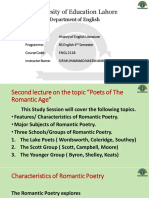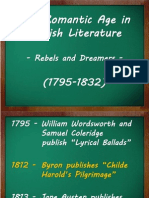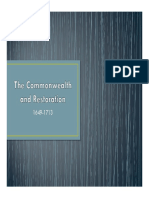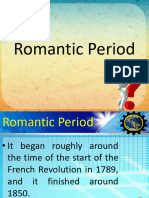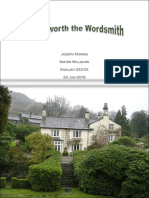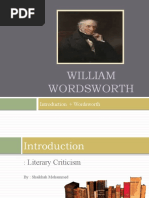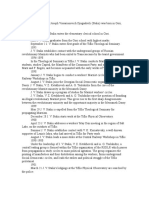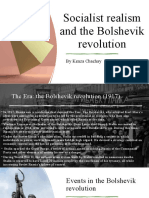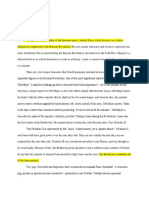0 ratings0% found this document useful (0 votes)
177 viewsThe World Is Too Much With Us
The World Is Too Much With Us
Uploaded by
cestlamourWilliam Wordsworth was a major English Romantic poet born in England's Lake District. He had a strong love of nature stemming from his childhood in the Lake District. He attended Cambridge University and traveled through Europe, spending significant time in France where he was exposed to the ideals of the French Revolution. Upon returning to England, he turned from politics to expressing his political views through literature. He worked with Samuel Taylor Coleridge to publish Lyrical Ballads in 1798 and is renowned for his long autobiographical work The Prelude. Wordsworth was a founder of the Romantic movement in reaction to Enlightenment ideas, emphasizing feelings, imagination, and intuition over reason in his poetry.
Copyright:
© All Rights Reserved
Available Formats
Download as PPTX, PDF, TXT or read online from Scribd
The World Is Too Much With Us
The World Is Too Much With Us
Uploaded by
cestlamour0 ratings0% found this document useful (0 votes)
177 views11 pagesWilliam Wordsworth was a major English Romantic poet born in England's Lake District. He had a strong love of nature stemming from his childhood in the Lake District. He attended Cambridge University and traveled through Europe, spending significant time in France where he was exposed to the ideals of the French Revolution. Upon returning to England, he turned from politics to expressing his political views through literature. He worked with Samuel Taylor Coleridge to publish Lyrical Ballads in 1798 and is renowned for his long autobiographical work The Prelude. Wordsworth was a founder of the Romantic movement in reaction to Enlightenment ideas, emphasizing feelings, imagination, and intuition over reason in his poetry.
Original Description:
Powerpoint Lecture
Original Title
The World is Too Much With Us
Copyright
© © All Rights Reserved
Available Formats
PPTX, PDF, TXT or read online from Scribd
Share this document
Did you find this document useful?
Is this content inappropriate?
William Wordsworth was a major English Romantic poet born in England's Lake District. He had a strong love of nature stemming from his childhood in the Lake District. He attended Cambridge University and traveled through Europe, spending significant time in France where he was exposed to the ideals of the French Revolution. Upon returning to England, he turned from politics to expressing his political views through literature. He worked with Samuel Taylor Coleridge to publish Lyrical Ballads in 1798 and is renowned for his long autobiographical work The Prelude. Wordsworth was a founder of the Romantic movement in reaction to Enlightenment ideas, emphasizing feelings, imagination, and intuition over reason in his poetry.
Copyright:
© All Rights Reserved
Available Formats
Download as PPTX, PDF, TXT or read online from Scribd
Download as pptx, pdf, or txt
0 ratings0% found this document useful (0 votes)
177 views11 pagesThe World Is Too Much With Us
The World Is Too Much With Us
Uploaded by
cestlamourWilliam Wordsworth was a major English Romantic poet born in England's Lake District. He had a strong love of nature stemming from his childhood in the Lake District. He attended Cambridge University and traveled through Europe, spending significant time in France where he was exposed to the ideals of the French Revolution. Upon returning to England, he turned from politics to expressing his political views through literature. He worked with Samuel Taylor Coleridge to publish Lyrical Ballads in 1798 and is renowned for his long autobiographical work The Prelude. Wordsworth was a founder of the Romantic movement in reaction to Enlightenment ideas, emphasizing feelings, imagination, and intuition over reason in his poetry.
Copyright:
© All Rights Reserved
Available Formats
Download as PPTX, PDF, TXT or read online from Scribd
Download as pptx, pdf, or txt
You are on page 1of 11
The World is Too Much With Us and
London 1802- Influential Writers and
Authors (Romantic)
Warm up question
Insert here
About William Wordsworth
Born in the Lake District of England.
Wordsworth has a huge love for nature.
Parents died when he was 13.
Entered Cambridge University in 1787.
He traveled through Europe after graduating.
He spent a lot of time in France.
It was in France he observed the ideals of the
French Revolution.
Woodworth returned to England due to lack
of funds.
Two months later England declared War on
France in 1793
Woodworth turned from politics to express his
views in his literature.
He became the father of Romanticism.
He worked together with Coleridge and
together they released Lyrical Ballads in 1798.
He is well known for his autobiographical work
The Prelude which was previous named
poem for Coleridge.
In 1798-1799 he worked on The Recluse, a
long philosophical poem.
The death of his brother in 1805 affected him
strongly.
The number of works declined after 1810,
because by then his lifestyle and view of life
had changed.
Many of the problems which he described in his
early works were for the most part resolved.
John Milton
A 17
th
century English poet.
He wrote during times of religious flux and
political upheaval in England.
He wrote many of his major works of poetry
during the Restoration period in 1660.
He protested the Commonwealth.
Romanticism
"Romanticism is precisely situated neither in choice of
subject nor exact truth, but in the way of feeling.
Charles Baudelaire
Romanticism began as a reaction towards the
prevailing Enlightenment ideas of the time.
It was first started by Wordsworth and Coleridge
Wordsworth would use his poetry to express his feelings
and thoughts about society.
For example, in London 1802, Wordsworth calls the English
people stagnant and selfish. He also states that English
Poet Milton was alive, things would be much better.
His hate of Industrialization.
While the Enlightenment encouraged deductive reasoning,
Romanticism emphasized intuition, imagination, and
feeling.
I must create a system or be enslaved by another man's.
William Blake
Early British Romantics were inspired by the French
Revolution.
Romantic poetry was also inspired by events that preceded
the French Revolution such as the Seven Years War, the
French and Indian War, and the American Revolution.
Romantic poetry usually contains a love of nature, a sense
of nationalism, and a sense of the supernatural.
Other Romantic poetry writers
William Blake - The Marriage of Heaven and Hell
Samuel Taylor Coleridge - Rime of the Ancient
Mariner
George Gordon, Lord Byron - Don Juan "Childe
Harold's Pilgrimage"
Percy Bysshe Shelley - Prometheus
Unbound "Adonais" "Ode to the west wind"
"Ozymandias"
John Keats - Great Odes "Hyperion" "Endymion"
Activity! Yay :]
Insert info here.
You might also like
- Romantic Poets & The Gothic NovelDocument35 pagesRomantic Poets & The Gothic NovelSonya Blade100% (1)
- ENGL1514 UNIT 5 ROMANTIC POETRY LECTURE 1 and William Blake BackgroundDocument6 pagesENGL1514 UNIT 5 ROMANTIC POETRY LECTURE 1 and William Blake BackgroundZINHLE MBATHANo ratings yet
- notes on the Romantic Era in English LiteratureDocument13 pagesnotes on the Romantic Era in English LiteraturehassammalikshamiNo ratings yet
- Romanticism in English Literature (The 19 Century)Document17 pagesRomanticism in English Literature (The 19 Century)I Uss100% (1)
- Romantic Period Lecture Notes (1798-1837) : I Will Not Reason & Compare: My Business Is To CreateDocument3 pagesRomantic Period Lecture Notes (1798-1837) : I Will Not Reason & Compare: My Business Is To CreateAnshika SharmaNo ratings yet
- Romantic Age Poetry (1798-1837)Document55 pagesRomantic Age Poetry (1798-1837)Sueda Kesil100% (1)
- Lec 29 MA PDFDocument51 pagesLec 29 MA PDFMuhammad Hassnain Muhammad HassnainNo ratings yet
- Second Lecture On The Romantic PoetsDocument25 pagesSecond Lecture On The Romantic PoetsMehwish Arif Mehwish ArifNo ratings yet
- American LiteratureDocument25 pagesAmerican LiteratureОксана ДашкоNo ratings yet
- Shelley Byron Keats New 85Document42 pagesShelley Byron Keats New 85Suresh VickeyNo ratings yet
- The Romantic Age in English LiteratureDocument40 pagesThe Romantic Age in English LiteratureJC Chavez100% (3)
- John Milton + Restoration LiteratureDocument44 pagesJohn Milton + Restoration LiteratureIsraa MostafaNo ratings yet
- Literature - The CommonwealthDocument24 pagesLiterature - The CommonwealthLiana Esa FajrianNo ratings yet
- WordsworthDocument10 pagesWordsworthNaeem Gul100% (1)
- Introduction To RomanticismDocument24 pagesIntroduction To Romanticismواحة التسليةNo ratings yet
- Victorian Period and Its Salient FeaturesDocument7 pagesVictorian Period and Its Salient FeaturesAsad Mehmood100% (2)
- Victorian Period IntroDocument37 pagesVictorian Period Introdesti purnama sariNo ratings yet
- William HazlittDocument3 pagesWilliam HazlittManshi YadavNo ratings yet
- European Literature Group2Document68 pagesEuropean Literature Group2Gemmadel Galang DuaquiNo ratings yet
- ENGLISH10 Romantic Period PPT 1Document48 pagesENGLISH10 Romantic Period PPT 1ANDREA MARI M. MACLIDNo ratings yet
- Romantic Period Arjay and NicoleDocument33 pagesRomantic Period Arjay and NicoleNhei Chole Quinto100% (1)
- American LiteratureDocument19 pagesAmerican LiteratureAngelo AguadaNo ratings yet
- Romanticism in EnglandDocument9 pagesRomanticism in EnglandManuel GregoriNo ratings yet
- Is A Poem That Tells A Story, The Poems May Be Short or Long? It's Usually No Dramatic, With Objective Verse and Regular Rhyme Scheme and MeterDocument1 pageIs A Poem That Tells A Story, The Poems May Be Short or Long? It's Usually No Dramatic, With Objective Verse and Regular Rhyme Scheme and MeterSharmaine Sierra CabreraNo ratings yet
- The Romantic PeriodDocument20 pagesThe Romantic Periodnadieh_baderkhani100% (1)
- 10 Famous International AuthorsDocument39 pages10 Famous International AuthorsAisah HaronNo ratings yet
- Thomas Stearns Eliot Patricia Lam Literature in Modern Media Ms. Hohl Period 2 30 April, 2015Document12 pagesThomas Stearns Eliot Patricia Lam Literature in Modern Media Ms. Hohl Period 2 30 April, 2015api-277487340No ratings yet
- Age of Romanticism-1Document30 pagesAge of Romanticism-1manahil dollNo ratings yet
- Outline of English LiteratureDocument3 pagesOutline of English LiteratureHassen AmmariNo ratings yet
- Victorian PoetryDocument27 pagesVictorian Poetryfedea17No ratings yet
- Victorian LiteratureDocument23 pagesVictorian LiteraturejunibertdelacruzNo ratings yet
- 11.1 The RomanticismDocument5 pages11.1 The RomanticismHaron Waweru (Engineer Waweru)No ratings yet
- Romanticism: Kubla Khan and ChristabelDocument2 pagesRomanticism: Kubla Khan and ChristabelKenNo ratings yet
- History of English LiteratureDocument9 pagesHistory of English LiteratureazizaNo ratings yet
- Evolution of English Over The YearsDocument16 pagesEvolution of English Over The YearsAnirudhNo ratings yet
- Wordsworth Portfolio - Final DraftDocument16 pagesWordsworth Portfolio - Final Draftapi-300846144No ratings yet
- Classicism in Early Period of English Enlightenment. (Alexander Pope's Creative Activity)Document8 pagesClassicism in Early Period of English Enlightenment. (Alexander Pope's Creative Activity)Akerke AmiralievaNo ratings yet
- Period of The Restoration (1660-1700)Document14 pagesPeriod of The Restoration (1660-1700)Tushmit Mehruba AkaNo ratings yet
- John Milton - WikipediaDocument46 pagesJohn Milton - WikipediaruponNo ratings yet
- John Milton 2012 7Document516 pagesJohn Milton 2012 7Ricardo Araiza SepulvedaNo ratings yet
- Victorian AgeDocument8 pagesVictorian AgeTyana StrNo ratings yet
- National Beginnings 2022Document35 pagesNational Beginnings 2022Mónica BarahonaNo ratings yet
- John Milton: English Poet and EssayistDocument7 pagesJohn Milton: English Poet and EssayistAlzan ZanderNo ratings yet
- John MiltonDocument22 pagesJohn MiltonMustafa Shar100% (1)
- Romanticism Was Reaction Against The Age of Enlightenment or Age of ReasonDocument4 pagesRomanticism Was Reaction Against The Age of Enlightenment or Age of Reasonfarah zaheerNo ratings yet
- Wa0031.Document20 pagesWa0031.Prabhjot KaurNo ratings yet
- ROMANTICISMDocument13 pagesROMANTICISMFeza KamalNo ratings yet
- The Lake PoetsDocument19 pagesThe Lake PoetsYuliiaNo ratings yet
- Seal MidtermsDocument7 pagesSeal Midtermsjhenr519No ratings yet
- Victorian AgeDocument5 pagesVictorian AgeNimai KumbhakarNo ratings yet
- William WordsworthDocument22 pagesWilliam WordsworthSara AbdullahNo ratings yet
- Week 1 RomanticismDocument31 pagesWeek 1 RomanticismEdita GashiNo ratings yet
- 1f77a903-0e61-4f1b-8a46-e598461eb88eDocument101 pages1f77a903-0e61-4f1b-8a46-e598461eb88eNihal YılmazNo ratings yet
- DocumentoDocument2 pagesDocumentoSalvatore LoritoNo ratings yet
- John MiltonDocument26 pagesJohn MiltongopalNo ratings yet
- Research Paper About Negative CapabilityDocument20 pagesResearch Paper About Negative CapabilityLAYLA •No ratings yet
- Authorized Images, Famous Authors Seen Through Antique and Vintage Postcards: Ralph Waldo Emerson, Nathaniel Hawthorne, Louisa May Alcott, Henry David ThoreauFrom EverandAuthorized Images, Famous Authors Seen Through Antique and Vintage Postcards: Ralph Waldo Emerson, Nathaniel Hawthorne, Louisa May Alcott, Henry David ThoreauNo ratings yet
- Oscar Wilde Complete Works – World’s Best Collection: 140+ Works All Plays, Poems, Poetry, Books, Stories, Fairy Tales, Rarities Plus Biographies & BonusesFrom EverandOscar Wilde Complete Works – World’s Best Collection: 140+ Works All Plays, Poems, Poetry, Books, Stories, Fairy Tales, Rarities Plus Biographies & BonusesNo ratings yet
- One Past, But Many HistoriesDocument86 pagesOne Past, But Many Historiesdale hernandezNo ratings yet
- Why We Defend The Soviet UnionDocument32 pagesWhy We Defend The Soviet Unionferneaux81100% (1)
- Latin American Peoples Win IndependenceDocument3 pagesLatin American Peoples Win Independenceapi-263848889No ratings yet
- Brief History of Leftist Guerrillas in Latin AmericaDocument2 pagesBrief History of Leftist Guerrillas in Latin Americakirpa100% (1)
- Handbook For Nonviolent Campaigns (Second Edition)Document232 pagesHandbook For Nonviolent Campaigns (Second Edition)Javier Gárate NeidhardtNo ratings yet
- Mark1 Report Filipino RevoltDocument7 pagesMark1 Report Filipino RevoltmarkoctaNo ratings yet
- The Cold War in A NutshellDocument5 pagesThe Cold War in A NutshellLalo SerenoNo ratings yet
- Thelwall, John - Sober ReflectionsDocument126 pagesThelwall, John - Sober Reflectionsfluxos100% (1)
- SampleSolved RRB NonTech 2 RPHDocument8 pagesSampleSolved RRB NonTech 2 RPHJasmine ShiekhNo ratings yet
- Selection and ProclamSELECTION AND PROCLAMATION OF NATIONAL HEROEation of National HeroesDocument18 pagesSelection and ProclamSELECTION AND PROCLAMATION OF NATIONAL HEROEation of National HeroesDarwin MarcosNo ratings yet
- (Cambridge Studies in Romanticism) Gregory Dart-Rousseau, Robespierre and English Romanticism (Cambridge Studies in Romanticism) - Cambridge University Press (1999)Document303 pages(Cambridge Studies in Romanticism) Gregory Dart-Rousseau, Robespierre and English Romanticism (Cambridge Studies in Romanticism) - Cambridge University Press (1999)La Oveja Negra Espacio Radiofónico100% (1)
- Osprey, Men-at-Arms #018 George Washington's Army (1972) OEF 8.12 PDFDocument50 pagesOsprey, Men-at-Arms #018 George Washington's Army (1972) OEF 8.12 PDFAdi Antonescu100% (2)
- Modern East Asia SyllabusDocument8 pagesModern East Asia Syllabuspaleoman8No ratings yet
- Histo HandoutDocument2 pagesHisto HandoutCarmella Mae QuidiligNo ratings yet
- QuizDocument3 pagesQuizGabriela VacaruNo ratings yet
- The Romanov Dynasty (Modern History)Document5 pagesThe Romanov Dynasty (Modern History)Jan SunNo ratings yet
- El FiliDocument5 pagesEl FiliDonnah Fe ManatoNo ratings yet
- Collapse of The UssrDocument17 pagesCollapse of The Ussrapi-278664076No ratings yet
- Stalin HistoryDocument24 pagesStalin HistoryMircea BlagaNo ratings yet
- Socialist Realism and The Bolshevik RevolutionDocument9 pagesSocialist Realism and The Bolshevik RevolutionkenzaNo ratings yet
- Katipunan FlagsDocument5 pagesKatipunan FlagsEmiko MiyokoNo ratings yet
- Persepolis TimelineDocument6 pagesPersepolis TimelineSallvio KastelliNo ratings yet
- Achyut Rao PatwardhanDocument22 pagesAchyut Rao PatwardhanGarima SharmaNo ratings yet
- Napoleon BonaparteDocument11 pagesNapoleon BonaparteChido MorganNo ratings yet
- Nations and NationalismDocument15 pagesNations and NationalismABDOULIENo ratings yet
- Madame TussaudDocument3 pagesMadame Tussaudapi-311509007No ratings yet
- Chapter 2 - Origins of American GovernmentDocument6 pagesChapter 2 - Origins of American GovernmentTiffaniNo ratings yet
- Animal Farm Essay 1Document3 pagesAnimal Farm Essay 1api-386412182No ratings yet
- Graphik LCG SpecimenDocument30 pagesGraphik LCG SpecimenpapalumNo ratings yet
- Guy Rundle - The Man Who Sold The WorldDocument2 pagesGuy Rundle - The Man Who Sold The Worldleejones_sanNo ratings yet







